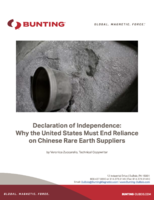IPC Whitepaper urges EU to consider science in RoHS recast.
Share:
Press Release Summary:
'Recasting the RoHS Directive: An Opportunity to Solidify Its Scientific Basis in Support of Comprehensive Environmental Regulation" urges members of EU and Parliament to ensure revised directive be scientifically based and aligned with REACH. It addresses EU Parliament amendment that bans brominated/chlorinated compounds, which could weaken scientific basis of RoHS and REACH. Ban of TBBPA would have similar implications, since studies have found it safe for human health/environment.
Original Press Release:
IPC Urges EU Leaders to Incorporate Science in RoHS Directive Recast
BANNOCKBURN, Ill., USA - IPC - Association Connecting Electronics Industries® has released a white paper, Recasting the RoHS Directive: An Opportunity to Solidify its Scientific Basis in Support of Comprehensive Environmental Regulation, urging members of the European Union (EU) Council and Parliament to ensure that the revised RoHS Directive be scientifically based and fully aligned with the Registration, Evaluation, Authorisation and Restriction of Chemicals (REACH) Regulation. Copies of the white paper will be sent to members of the EU Council and members of the EU Parliament's Environment Committee.
Of utmost concern to the electronics industry is an amendment proposed in the EU Parliament that bans all brominated and chlorinated flame retardants, polyvinyl chloride (PVC), chlorinated plasticizers and three phthalates. This amendment would weaken the scientific basis of the RoHS Directive and directly contradict the REACH Regulation, a comprehensive chemicals regulation that is setting a global standard for chemical safety.
Fern Abrams, IPC director of government relations and environmental policy says, "Restricting an entire class of compounds - brominated and chlorinated flame retardants - without a strong scientific basis risks wasting societal resources to develop and implement substitutes and potentially risks unintended consequences associated with alternative substances."
According to the amendment proposed for consideration in Parliament, Tetrabromobisphenol-A (TBBPA), the primary brominated flame retardant used in printed boards, would be banned under a revised RoHS Directive. This would be a direct contradiction with the REACH Regulation. Several scientific studies of TBBPA, including a comprehensive EU Risk Assessment, found TBBPA to be safe for human health and the environment.
"Fully aligning the RoHS Directive and REACH Regulation would ensure minimal regulatory overlap and affirm the EU's credibility throughout the world," says Lee Wilmot, director of environmental health and safety (EHS) at TTM Technologies, and chairman of IPC's EHS Steering Committee. "In order to ensure a positive impact on the environment, the recast of RoHS must improve the scientific basis of this important environmental directive and unify European chemicals regulations by aligning the RoHS Directive with the REACH Regulation. Any contrary action would be considered political jockeying that could adversely affect the environment at significant costs to industry."
To download IPC's white paper, Recasting the RoHS Directive: An Opportunity to Solidify its Scientific Basis in Support of Comprehensive Environmental Regulation, visit leadfree.ipc.org/recasting-rohs-directive. For more information on IPC's environmental policies and initiatives, contact Abrams at FernAbrams@ipc.org or +1 703-522-0225.
About IPC
IPC (www.IPC.org) is a global trade association based in Bannockburn, Ill., dedicated to the competitive excellence and financial success of its 2,700 member companies which represent all facets of the electronics industry, including design, printed board manufacturing, electronics assembly and test. As a member-driven organization and leading source for industry standards, training, market research and public policy advocacy, IPC supports programs to meet the needs of an estimated $1.7 trillion global electronics industry. IPC maintains additional offices in Taos, N.M.; Arlington, Va.; Garden Grove, Calif.; Stockholm, Sweden; Moscow, Russia; and Shanghai and Shenzhen, China.




